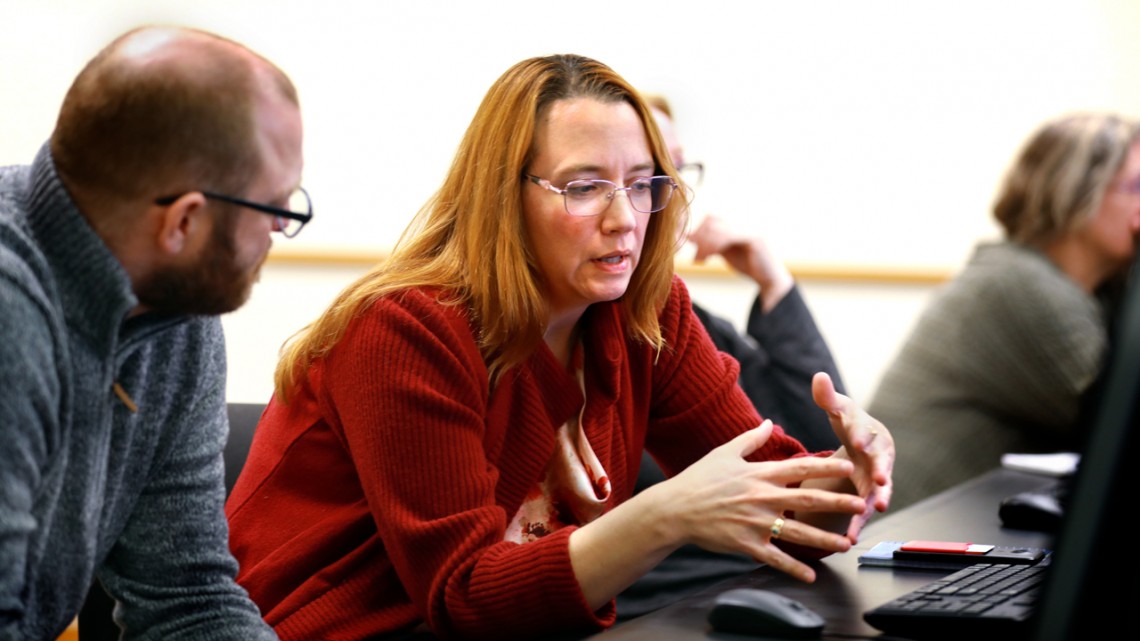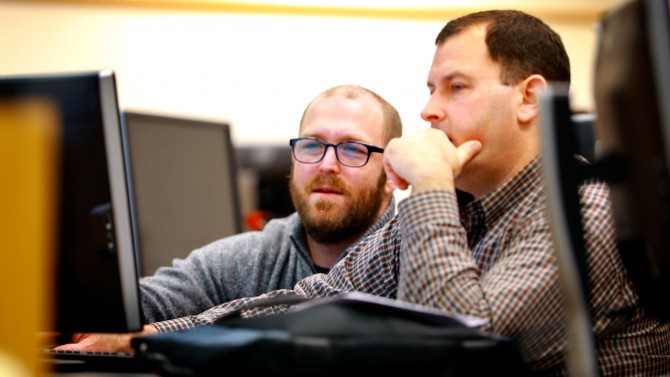
Leah Cook, coordinator for the plant sciences major in the School of Integrative Plant Science, discusses Canvas with James Whalley, instructional designer at the Center for Teaching Innovation.
Courses continue transition from Blackboard to Canvas
By Caitlin Hayes
Cornell has entered the second semester of its transition from Blackboard to Canvas, with more than half of all courses now using the new learning management system. Blackboard will be unavailable after the fall 2019 semester.
Canvas provides an online space where faculty can communicate important course information and engage students beyond the classroom. Early faculty adopters of Canvas say it is easy to use and offers more opportunities for innovation, while students appreciate features such as the Calendar and mobile app.
Four colleges have already fully transitioned, and all courses for first-year students are using Canvas. At the Center for Teaching Innovation (CTI), three instructional designers and a support team dedicated to the Canvas transition have created resources and have been offering workshops and individual consultations for faculty.
“Letting everyone know about the transition, and supporting faculty, students and staff throughout, is an enormous job, and the team has worked tirelessly,” said Rob Vanderlan, associate director at the CTI. “It has taken a close partnership with Cornell Information Technologies, important work with campus colleagues such as the registrar, and support from the associate deans in each college to make this successful.”
Around 250 faculty began using Canvas in the spring semester in courses enrolling a total of more than 10,000 students. Survey results from the spring showed that over 80% of faculty respondents were either satisfied or very satisfied with Canvas, and 73% rated Canvas as better than Blackboard, with only 5% preferring Blackboard. Faculty also reported overwhelming satisfaction with the various support services available, including the Canvas 24/7 call or chat line and CTI’s email support and consultations.
When surveyed, students preferred Canvas to Blackboard for navigating the platform, submitting assignments, checking grades, tracking due dates and accessing the mobile app.
“Moving to Canvas is the first step. After the initial transition, we hope faculty will continue to think about how to best use Canvas as a learning tool,” said Vanderlan. “Our experience with our pilot faculty suggests that many faculty take one semester to settle in before trying new features.”
Canvas offers faculty functionalities that Blackboard doesn’t, including the automated creation of course sites (eliminating the need to request courses from Faculty Center), the ability to create and manage course sections and to grant temporary student access to waitlisted courses, and to more seamlessly integrate a growing list of third-party teaching tools, many of which facilitate and enhance innovation and communication between faculty and students.
Kelly Zamudio, the Goldwin Smith Professor of Ecology and Evolutionary Biology, said Canvas was integral in creating an online version of her Introduction to Evolutionary Biology and Diversity course, which will run alongside the in-person class this fall. The course features numerous videos, animations and innovative ways for students to work together in teams online, some of which Zamudio and her team will integrate into the face-to-face class.
“We could not have done it in Blackboard,” Zamudio said.
The enabling of these kinds of innovations is a main aspiration for the migration to Canvas and part of its motivation. Vanderlan said CTI will assess over time Canvas’ impact on teaching innovation at Cornell.
In the meantime, as faculty teach in Canvas for the first time this semester, or prepare to use Canvas in the spring 2020 semester, a number of resources are available in the Canvas@Cornell Resource Library, including online tutorials, guides, a schedule of in-person workshops, and resources faculty can share with students. Faculty can also find help directly from Canvas’ guides.
Caitlin Hayes is a communications specialist for the Center for Teaching Innovation.
Media Contact
Get Cornell news delivered right to your inbox.
Subscribe

